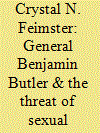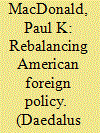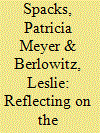|
|
|
Sort Order |
|
|
|
Items / Page
|
|
|
|
|
|
|
| Srl | Item |
| 1 |
ID:
087590


|
|
|
|
|
| Publication |
2009.
|
| Summary/Abstract |
When I told friends that I was heading
off to a doctoral program in U.S. intellectual
history, they either seemed mysti
½ed-"Do we have an intellectual history?"-
or found the entire proposition
somewhat funny: "American intellectual
history!? Isn't that an oxymoron!?"
More skepticism awaited as I began my
studies. Classmates repeatedly subjected
me to playful, if remorseless, interrogations
about the wherefores and whithers
of this so-called history of the American
mind. I had to wonder what I was doing
studying a subject that people think does
not exist.
|
|
|
|
|
|
|
|
|
|
|
|
|
|
|
|
| 2 |
ID:
087604


|
|
|
|
|
| Publication |
2009.
|
| Summary/Abstract |
As a young girl growing up in the
South, I was forced to watch Gone With
the Wind throughout my primary and
secondary education. As May dwindled
into June, teachers grew weary of lecturing
on multiplication tables or constitutional
history and resorted to "historical
½lms" to pass the time, with Gone With
the Wind at the top of the list. I hated the
movie at every age-and not because I
wanted to crawl under my desk and die
of humiliation every time a black person
came on screen. Rather, the ½lm's violent
content, speci½cally its sexual undertones,
gave me nightmares. In one
instance, Scarlett, confronted by a Yankee
soldier, shoves a pistol in his face
and pulls the trigger. The viewer understands
Scarlett's motivation: that implicit
in the "unspeakable horrors that
lay bound up in the name of 'Yankee'"
is the threat of rape.
|
|
|
|
|
|
|
|
|
|
|
|
|
|
|
|
| 3 |
ID:
087586


|
|
|
|
|
| Publication |
2009.
|
| Summary/Abstract |
Since its emergence in the nineteenth
century, public health has primarily
been the charge of nation-states acting
to maintain the health of populations.1
In addition to taking steps to prevent
disease, governments deploy the rhetoric
of health and "hygiene" to police the
behavior and movements of immigrants
and colonial subjects.2 Yet the mobility
of microbes that circulate "through air
travel, commerce, and the circuits of
capital"3 has given rise to transnational
institutions such as the U.S. Centers for
Disease Control and the World Health
Organization, which track disease vulnerability
worldwide and pursue improvement
in the health of world populations.
|
|
|
|
|
|
|
|
|
|
|
|
|
|
|
|
| 4 |
ID:
087591


|
|
|
|
|
| Publication |
2009.
|
| Summary/Abstract |
At the turn of the twentieth century,
the U.S. system of public ½nance underwent
a dramatic structural transformation.
The late-nineteenth-century system
of indirect national taxes-associated
mainly with the highly partisan
tariff and regressive excise taxes on alcohol
and tobacco-was eclipsed in the
early twentieth century by a professionally
administered, graduated income tax
that soon accounted for more than half
of all federal tax revenue. This seismic
shift toward direct and progressive taxation
marked the emergence of a new
½scal polity, one guided not simply by
the functional need for revenue, but by
social concerns about justice, fairness,
and the equitable distribution of ½scal
obligations.
|
|
|
|
|
|
|
|
|
|
|
|
|
|
|
|
| 5 |
ID:
087599


|
|
|
|
|
| Publication |
2009.
|
| Summary/Abstract |
The collapse of the Soviet Union in
the early 1990s raised concerns about
the security of its nuclear weapons.1
In response, the United States joined
forces with countries of the former Soviet
Union, especially Russia, as well as
the European Union and other states,
to create a series of programs aimed
at securing former Soviet weapons of
mass destruction (wmd), weaponsrelevant
materials, and scienti½c expertise.
Of these efforts, the most troubled
has been the one aimed at containing
wmdskills and knowledge. Former Soviet
weapons experts haven't sold their
knowledge around the world; indeed,
there have been almost no documented
cases of such proliferation (although
concerns remain about what goes unreported).
Rather, it is the means chosen
for ½ghting such proliferation-working
with and reemploying wmdexperts
-that have proven problematic.
|
|
|
|
|
|
|
|
|
|
|
|
|
|
|
|
| 6 |
ID:
087592


|
|
|
|
|
| Publication |
2009.
|
| Summary/Abstract |
Experience has lessons to impart. Its
ability to teach, however, turns on our
willingness to learn. Attending to the
lessons of human experience brought
American pragmatists of the nineteenth
century to a new conception of philosophy,
one that embraced the fallibilism
that had long de½ned the natural sciences.
It led them back to the abiding
existential questions that underpinned
the Wisdom Traditions of the past in
order to explore the personal, social,
and political trials of the present. These
thinkers established a new intellectual
tradition that allows
|
|
|
|
|
|
|
|
|
|
|
|
|
|
|
|
| 7 |
ID:
087603


|
|
|
|
|
| Publication |
2009.
|
| Summary/Abstract |
The United States faces unprecedented
foreign policy and national security
challenges.1 Conflicts in Iraq and Afghanistan,
the global war on terrorism,
the proliferation of nuclear weapons,
the increasing assertiveness of Russia,
the growth of Chinese military power,
global climate change, not to mention
the spread of poverty, infectious diseases,
and ethnic and religious strife
around the world: the challenges aren't
limited; the resources to meet them are.
The high operational tempo of the wars
in Iraq and Afghanistan has stretched
the military to the breaking point. The
ongoing ½nancial crisis and economic
recession will severely limit the ability
of the federal government to sustain
or increase expenditures for defense
and foreign aid.
|
|
|
|
|
|
|
|
|
|
|
|
|
|
|
|
| 8 |
ID:
087598


|
|
|
|
|
| Publication |
2009.
|
| Summary/Abstract |
Shortly after William Bradford and
his fellow pilgrims arrived on the eastern
shores of the New World in the cold
autumn of 1620, a small group of men
set out to make a "full discovery" of the
snow-covered land.1 After some days
of wandering the unknown rivers and
hills, they grew hungry. With Providence
observing, they thought, the men happened
upon a store of corn and grain
that Indians had cached underground.
The ravenous pilgrims took the food
for their own. The next day, Bradford
reports that the company wandered
into the wilderness deeper still, following
the well-beaten trails of the Indians,
in the hope that they would ½nd a town;
they encountered no one. Eventually
the company came to a flat area covered
with boards. Curious, the men
began to dig.
|
|
|
|
|
|
|
|
|
|
|
|
|
|
|
|
| 9 |
ID:
086628


|
|
|
|
|
| Publication |
2009.
|
| Summary/Abstract |
The essays assembled here enact as well as reflect the humanities. As they explore the twenty-first-century state of humanistic study and humanistic commitment, they exemplify historical awareness, analytic power, and critical consciousness.
|
|
|
|
|
|
|
|
|
|
|
|
|
|
|
|
| 10 |
ID:
087594


|
|
|
|
|
| Publication |
2009.
|
| Summary/Abstract |
The pillars of the "urban renewal order,"
shorthand for an interlocking set
of social policies since the 1940s, were
crumbling fast by the 1960s. Urban populations,
especially in Western Europe,
the United States, and Canada, suddenly
no longer wanted the variety of once
progressive-minded public programs it
encompassed: highways through cities,
demolitions aimed at clearing "blighted"
or "gray" areas, redevelopment for public
housing superblocks and other megaprojects.
A slum in the eyes of a planner,
it turned out, was often a resident's cherished
homestead, and soon proponents
of the City of Tomorrow ran up against
increasing opposition. The fall of the
urban renewal order was driven from
below, to be sure; but the ideology of
this grassroots uprising was not clearly
drawn from the traditional left or right.
Yet in its wake opened a fleeting conceptual
space, where the fate of urban planning
and policy-even urban life in general-
could be debated and reconsidered,
sometimes quite radically.
|
|
|
|
|
|
|
|
|
|
|
|
|
|
|
|
| 11 |
ID:
087596


|
|
|
|
|
| Publication |
2009.
|
| Summary/Abstract |
When Ralph Ellison said that "the
joke [is] at the center of the American
identity," he also meant that the joker is
at the center of American life. In a rapidly
changing liberal society, with fluctuating
standards and values, the joker is
an "American virtuoso of identity who
thrives on chaos and swift change."1
For the joker, identity is not a ½xed principle,
established once and for all, but
a fluid masquerade, an ironic display
of masks and styles, gestures and titles,
which accrue around a space that comes
to be known as the "self."
A great deal of work on identity politics
has focused on similar constructions
of racial identity through complex
cultural appropriations linked to
masking, minstrelsy, and passing. But
Ellison is more optimistic about these
dynamics: he sees the absurd mix of
styles that emerges from what he calls
"pluralistic turbulence" as the only appropriate
response to the absurdities
of American politics and history.2 Accordingly,
anyone who assumes too
serious a relationship with his own
identity-anyone who refuses to play
the joker-will likely be duped by more
powerful jokers still.
|
|
|
|
|
|
|
|
|
|
|
|
|
|
|
|
| 12 |
ID:
087581


|
|
|
|
|
| Publication |
2009.
|
| Summary/Abstract |
During the 2008 vice presidential debate,
Alaska Governor Sarah Palin was
pressed by her Democratic rival, Delaware
Senator Joe Biden, and moderator
Gwen I½ll to reply to a question she had
previously ignored. The chipper Palin,
who thrived on the perception of being
persecuted, demurred. "I may not answer
the questions that either the moderator
or you want to hear," she parried,
"but I'm going to talk straight to the
American people."1
For this statement, Palin suffered not
only rebuke, but ridicule. Flaunting her
intent to duck a question amounted to
a failure of manners. Part of the performance
of a presidential (or vice presidential)
debate, after all, consists of following
certain conventions.
|
|
|
|
|
|
|
|
|
|
|
|
|
|
|
|
| 13 |
ID:
087589


|
|
|
|
|
| Publication |
2009.
|
| Summary/Abstract |
It is often said that being an American
means sharing a commitment to a set
of values and ideals.1Writing about the
relationship of ethnicity and American
identity, the historian Philip Gleason put
it this way:
To be or to become an American, a person
did not have to be any particular national,
linguistic, religious, or ethnic background.
All he had to do was to commit himself to
the political ideology centered on the abstract
ideals of liberty, equality, and republicanism.
Thus the universalist ideological
character of American nationality meant
that it was open to anyone who willed to
become an American.2
|
|
|
|
|
|
|
|
|
|
|
|
|
|
|
|
|
|
|
|
|